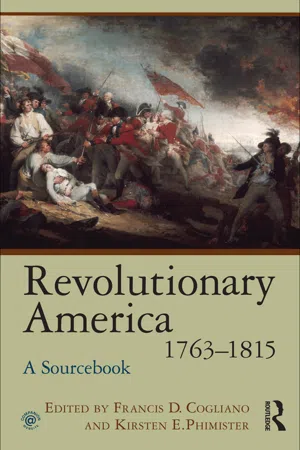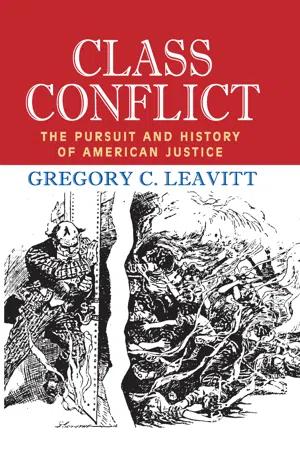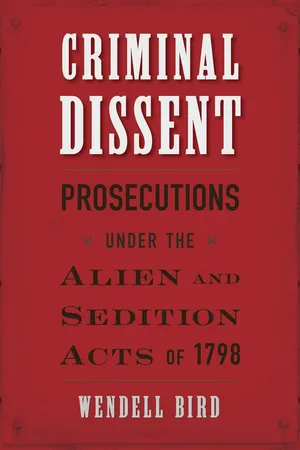History
Federalist Revolts
The Federalist Revolts were a series of uprisings in the United States during the late 18th and early 19th centuries. They were led by opponents of the Federalist Party's policies, particularly the Alien and Sedition Acts, which were seen as infringing on individual liberties. The revolts reflected the deep political divisions and tensions within the young nation.
Written by Perlego with AI-assistance
Related key terms
3 Key excerpts on "Federalist Revolts"
- eBook - ePub
Revolutionary America, 1763-1815
A Sourcebook
- Francis D. Cogliano, Kirsten E. Phimister(Authors)
- 2010(Publication Date)
- Routledge(Publisher)
CHAPTER 10 The Federalist EraIntroduction
After the election of George Washington as the first president in January 1789, his supporters and political allies called themselves Federalists. The Federalists won successive elections in 1792 and 1796 and they did not lose the presidency until the election of 1800. A major area of contention between the Federalists and their adversaries, who came to be known as Republicans, was political economy. Economic instability was, perhaps, the biggest problem facing the new government. Washington’s Treasury Secretary, Alexander Hamilton, developed a comprehensive economic program under the terms of which the federal government would assume the public debts of the states and promote manufacturing (document 1). Hamilton believed that the United States should emulate Britain’s economic model. Opposition to Hamilton’s program coalesced in and out of Congress (document 2). The Republicans opposed state-supported manufacturing and sought to maintain the United States as an agricultural nation of independent small farmers. The leading exponent of this view was Thomas Jefferson who served as Secretary of State under Washington and as Vice President to John Adams. In his Notes on the State of Virginia, Jefferson articulated a vision of republican political economy which eschewed manufacturing in favor of agriculture (document 3).Hamilton sought, in part, to finance his fiscal program—which was meant to strengthen the federal government as well as the economy—through an excise tax on whiskey. In 1794 the excise duty, which was very unpopular, especially in frontier areas, led to a rebellion in western Pennsylvania. The Whiskey Rebellion was a direct challenge to the authority of the federal government and seemed to threaten the authority of the new constitution. As a consequence, the Federalists used the army to suppress the disorder (document 4). Washington’s presidency coincided with the early stages of the French Revolution, which bitterly divided Americans. Although Washington proclaimed the United States neutral in the wars of the French Revolution, the Federalists were sympathetic to Britain and the Republicans to France. In his 1796 “Farewell Address” (document 5), Washington warned Americans against political partisanship and entangling alliances with foreign powers. Notwithstanding this warning, partisanship and international tensions increased during the administration of Washington’s successor, John Adams. During Adams’s administration the United States and France waged a “quasi-war” at sea. In anticipation of a formal declaration of war, the Federalists in Congress adopted a series of measures, the Alien and Sedition Acts (document 6) which sought to limit the right to free speech and to extend the period of time which immigrants would have to wait to become American citizens. Republicans objected to these measures. As the leaders of the Republicans, Madison and Jefferson arranged for the legislatures of Virginia and Kentucky to adopt a series of resolutions denouncing the Alien and Sedition Acts and raising the specter that individual states might nullify federal legislation (document 7). Although no other states endorsed these resolutions, the Alien and Sedition Acts were unpopular and contributed to the defeat of the Federalists in 1800. - eBook - ePub
Class Conflict
The Pursuit and History of American Justice
- Gregory C. Leavitt(Author)
- 2017(Publication Date)
- Routledge(Publisher)
Many of those who advanced the Articles’ failings began to privately urge the creation of a new constitution. They wanted a federal system that gave the central government more power and that did not depend on the consent and unanimity of the states. These advocates became known as Federalists. In the beginning, they were an informal group of like-minded men, mainly from the American gentry, who wanted property rights protected from the whims of state governments. Likewise, they wanted a centralized system that would enhance their economic activities and make business standards and regulations uniform across the states (Beard 1943[1915]:2–3). As would become clear later, the Federalists also wanted a central taxing authority that would spread taxes across the general population while also protecting and enhancing their wealth. This stratagem would soon enough play itself out in Shay’s Rebellion (1786–87) and the Whiskey Rebellion (1794). After the new Constitution became law, the Federalists formed a political party of the same name to further advance their positions and philosophy.The Federalists were largely composed of a distilled American gentry who fundamentally believed that “[t]he ideal harmonious society was one that recognized the ‘necessity of subordination,’ one in which everyone found his proper place and did not try to attain a rank for which he was unsuited. . . . If the Federalists were willing to be recognized as distinctive at all, they wanted to be thought of as the rightful rulers of the society, as disinterested leaders beset by hordes of Jacobinical sans-culottes who were out to destroy all harmony and order in the society” (Wood 2009:105–106; 214–215).3 ,4The Federalists’ concerns were mainly twofold—that the federal government be strong enough to protect private property interests from the economic vagaries of the various states and the masses of people and to command the authority of a collective entity with a distinct and legitimate identity that could wage war and collect revenue. Through a central military and foreign policy the government could more easily penetrate and protect the world market for American merchants. - eBook - ePub
Criminal Dissent
Prosecutions under the Alien and Sedition Acts of 1798
- Wendell Bird(Author)
- 2020(Publication Date)
- Harvard University Press(Publisher)
12The American Revolution had weakened many of the foundations of that hierarchical structure, in a number of ways beyond replacing monarchy with republican government.13 The patriots embraced radical Whig ideology along with classical republicanism, and both philosophies were notably unfriendly to unfettered powers, limitations of individual rights, and demands for passive obedience to rulers.14 Also, the Revolution brought a “revolution in rights,” which included discussions in speeches and newspapers, state declarations of rights, development of natural rights theory, and broader rights in practice.15 Moreover, the most influential loyalists were forced to emigrate and, in place of their positions, new state offices were created. A number of newly prosperous contenders for political office and leadership arose, enriched from military supply contracts, confiscated property sales, privateering, or speculation in government obligations.16 Further, the American Revolution included a social transformation from the colonial order to a republican order, as Edward Countryman noted, which continued long afterward, though it failed to convey its benefits to many Americans—enslaved people, women, Native Americans, and others.17 Most Federalists seemed to be less aware than most Republicans of the social changes prompted by the Revolution, at least until the electoral college divulged the results of the presidential election of 1800.Most Federalists and Republicans also differed in their view of the permissibility of dissent in opposition to the administration.18 A hierarchical view of government led to a Federalist expectation of deference, not criticism, toward the “leading men” in office. Federalists were
Index pages curate the most relevant extracts from our library of academic textbooks. They’ve been created using an in-house natural language model (NLM), each adding context and meaning to key research topics.


